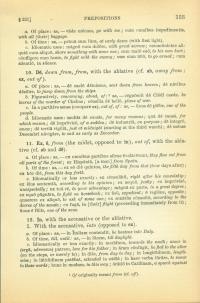220. Prepositions are regularly used either with the accusative or with the ablative.
a. The following prepositions are used with the accusative.
| ad to | circiter about | intrā inside |
| adversus against | cis, citrā this side | iūxtā near |
| adversum towards | contrā against | ob on account of |
| ante before | ergā towards | penes in the power of |
| apud at, near | extrā outside | per through |
| circā around | īnfrā below | pōne behind |
| circum around | inter among | post after |
| praeter beyond | secundum next to | ultrā on the further side |
| prope near | suprā above | versus towards |
| propter on account of | trāns across | |
b. The following prepositions are used with the ablative.1
| ā, ăb, abs away from, by | ē, ex out of |
| absque without, but for | prae in comparison with |
| cōram in presence of | prō in front of, for |
| cum with | sine without |
| dē from | tenus up to, as far as |
c. The following may be used with either the accusative or the ablative, but with a difference in meaning.
| in into, in | sub under |
| subter beneath | super above |
In and sub, when followed by the accusative, indicate motion to, when by the ablative, rest in, a place.
Vēnit in aedīs.
He came into the house.
Erat in aedibus.
He was in the house.
Disciplīna in Britanniā reperta atque inde in Galliam trānslāta esse exīstimātur.
The system is thought to have been discovered in Great Britain and thence brought over to Gaul.
Sub īlice cōnsederat.
He had seated himself under an ilex.
sub lēgēs mittere orbem
to subject the world to laws (to send the world under laws)
221. The uses of the prepositions are as follows.
1. Ā, ab (away from,2 from, off from) with the ablative.
a. Of place.
Ab urbe profectus est.
He set out from the city.
b. Of time.
(1) from
ab hōrā tertiā ad vesperam
from the third hour till evening
(2) just after
ab eō magistrātū
after [holding] that office
c. Idiomatic uses.
Ā reliquīs differunt.
They differ from the others.
ā parvulīs
from early childhood
prope ab urbe
near (not far from) the city
līberāre ab
to set free from
occīsus ab hoste (periit ab hoste)
slain by an enemy
ab hāc parte
on this side
ab rē êius
to his advantage
ā rē pūblicā
for the interest of the state
2. Ad (to, towards, at, near) with the accusative (cf. in into).
a. Of place.
Ad urbem vēnit.
He came to the city.
ad merīdiem
towards the south
ad exercitum
to the army
ad hostem
toward the enemy
ad urbem
near the city
b. Of time.
ad nōnam hōram
till the ninth hour
c. With persons.
Ad eum vēnit.
He came to him.
d. Idiomatic uses.
Ad supplicia dēscendunt
They resort to punishment.
Ad haec respondit.
To this he answered.
ad tempus
at the [fit] time
adīre ad rem pūblicam
to go into public life
ad petendam pācem
to seek peace
ad latera
on the flank
ad arma
to arms
ad hunc modum
in this way
quem ad modum
how, as
ad centum
nearly a hundred
ad hōc
besides
omnēs ad ūnum
all to a man
ad diem
on the day
3. Ante (in front of, before) with the accusative (cf. post after).
a. Of place.
ante portam
in front of the gate
ante exercitum
in advance of the army
b. Of time.
ante bellum
before the war
c. Idiomatic uses.
ante urbem captam
before the city was taken
ante diem quīntum (a.d.v.) Kal.
the 5th day before the Kalends
ante quadriennium
four years before or four years ago
ante tempus
too soon
(before the time)
4. Apud (at, by, among) with the accusative.
a. Of place (rare and archaic).
apud forum
at the forum (in the marketplace).
b. With reference to persons or communities.
apud Helvētiōs
among the Helvetians
apud populum
before the people
apud aliquem
at one's house
apud sē
at home or in his senses
apud Cicerōnem
in [the works of] Cicero
5. Circā (about, around) with the accusative (cf. circum, circiter).
a. Of place.
templa circā forum
the temples about the forum
circā sē habet
he has with him (of persons)
b. Of time or number (in poetry and later writers).
circā eandem hōram
about the same hour
circā īdūs Octōbrīs
about the fifteenth of October
circā decem mīlia
about ten thousand
c. Figuratively [in later writers, about, in regard to] (cf. dē).
circā quem pūgna est
with regard to whom, etc.
circā deōs neglegentior
rather neglectful of (i.e. in worshiping) the gods
6. Circiter (about) with the accusative.
a. Of time or number.
circiter īdūs Novembrīs
about the 13th of November
circiter merīdiem
about noon
7. Circum (about, around) with the accusative.
a. Of place.
circum haec loca
hereabout
circum Capuam
around Capua
circum illum
with him
lēgātiō circum īnsulās missa
an embassy sent to the islands round about
circum amīcōs
to his friends round about
8. Contrā (opposite, against) with the accusative.
contrā Ītaliam
over against Italy
contrā haec
in answer to this
a. Often as adverb.
haec contrā
this in reply
contrā autem
but on the other hand
quod contrā
whereas, on the other hand
9. Cum (with, together with) with the ablative.
a. Of place.
vāde mēcum
go with me
cum omnibus impedīmentīs
with all [their] baggage
b. Of time.
prīmā cum lūce
at early dawn
(with first light).
c. Idiomatic uses.
māgnō cum dolōre
with great sorrow
commūnicāre aliquid cum aliquō
share something with some one
cum malō suō
to his own hurt
cōnflīgere cum hoste
to fight with the enemy
esse cum tēlō
to go armed
cum silentiō
in silence
10. Dē (down from, from) with the ablative (cf. ab away from; ex out of).
a. Of place.
dē caelō dēmissus
sent down from heaven
dē nāvibus dēsilīre
to jump down from the ships
b. Figuratively, concerning, about, of.3
Cōgnōscit dē Clōdī caede.
He learns of the murder of Clodius.
cōnsilia dē bellō
plans of war
c. In a partitive sense (compare ex), out of, of.
ūnus dē plēbe
one of the people
d. Idiomatic uses.
multīs dē causīs
for many reasons
quā dē causā
for which reason
dē imprōvīsō
of a sudden
dē industriā
on purpose
dē integrō
anew
dē tertiā vigiliā
just at midnight
(starting at the third watch)
dē mēnse Decembrī nāvigāre
to sail as early as December
11. Ex, ē [from (the midst), out of; opposed to in] with the ablative (cf. ab and dē).
a. Of place.
Ex omnibus partibus silvae ēvolāvērunt.
They flew out from all parts of the forest.
ex Hispāniā
(a man) from Spain
b. Of time.
ex eō diē quīntus
the 5th day from that
(four days after)
ex hōc diē
from this day forth
c. Idiomatically or less exactly.
ex cōnsulātū
right after his consulship:
ex êius sententiā
according to his opinion
ex aequō
justly
ex imprōvīsō
unexpectedly
ex tuā rē
to your advantage
māgnā ex parte
in a great degree
ex equō pūgnāre
to fight on horseback
ex ūsū
expedient
ē regiōne
opposite
quaerere ex aliquō
to ask of some one
ex senātūs cōnsultō
according to the decree of the senate
ex fugā
in (their) flight
ūnus ē fīliīs
one of the sons
12. In, with the accusative or the ablative.
(1) With the accusative: into (opposed to ex).
a. Of place.
In Ītaliam contendit.
He hastens into Italy.
b. Of time: till, until.
in lūcem
till daylight
c. Idiomatically or less exactly.
in merīdiem
towards the south
amor in (ergā, adversus) patrem
love for his father
In āram cōnfūgit.
He fled to the altar.
(on the steps, or merely to)
in diēs
from day to day
in longitūdinem
lengthwise
in lātitūdinem patēbat
extended in width
in haec verba iūrāre
to swear to these words
hunc in modum
in this way
ōrātiō in Catilīnam
a speech against Catiline
in perpetuum
forever
in pêius
for the worse
in diem vīvere
to live hand-to-mouth (for the day)
(2) With the ablative: in, on, among.
In very various connections.
in castrīs
in the camp
(cf. ad castra to, at, or near the camp)
in marī
on the sea
in urbe esse
to be in town
in tempore
in season
in scrībendō
while writing
Est mihi in animō.
I have it in mind.
(I intend.)
in ancorīs
at anchor
in hōc homine
in the case of this man
in dubiō esse
to be in doubt
13. Īnfrā (below) with the accusative.
a. Of place.
ad mare īnfrā oppidum
by the sea below the town
īnfrā caelum
under the sky
b. Figuratively or less exactly.
īnfrā Homērum
later than Homer
īnfrā trēs pedēs
less than three feet
īnfrā elephantōs
smaller than elephants
īnfrā īnfimōs omnīs
the lowest of the low
14. Inter (between, among) with the accusative.
inter mē et Scīpiōnem
between myself and Scipio
inter ōs et offam
between the cup and the lip
(the mouth and the morsel)
inter hostium tēla
amid the weapons of the enemy
inter omnīs prīmus
first of all
inter bibendum
while drinking
inter sē loquuntur
they talk together
15. Ob (towards, on account of) with the accusative.
a. Literally:
(1) of motion (archaic).
ob Rōmam
towards Rome (Ennius)
ob viam
to the road
(preserved as adverb, in the way of)
(2) Of place in which, before, in a few phrases.
ob oculōs
before the eyes
b. Figuratively, in return for (mostly archaic, probably a word of account, balancing one thing against another).
ob mulierem
in pay for the woman
ob rem
for gain
Hence applied to reason, cause, and the like, on account of (a similar mercantile idea), for.
ob eam causam
for that reason
quam ob rem (quamobrem)
wherefore, why
16. Per (through, over) with the accusative.
a. Of motion.
per urbem īre
to go through the city
per mūrōs
over the walls
b. Of time.
per hiemem
throughout the winter
c. Figuratively, of persons as means or instruments.
per hominēs idoneōs
through the instrumentality of suitable persons
licet per mē
you (etc.) may for all me
Hence, stat per mē (it is through my instrumentality) and per sē (in and of itself).
d. Weakened, in many adverbial expressions.
per iocum
in jest
per speciem
in show, ostentatiously
17. Prae (in front of) with the ablative.
a. Literally, of place (in a few connections).
prae sē portāre
to carry in one's arms
prae sē ferre
to carry before one;
exhibit or proclaim ostentatiously (figuratively)
make known
b. Figuratively, of hindrance, as by an obstacle in front (compare English for).
Prae gaudiō conticuit.
He was silent for joy.
c. Of comparison.
prae māgnitūdine corporum suōrum
in comparison with their own great size
18. Praeter (along by, by) with the accusative.
a. Literally.
praeter castra
by the camp
(along by, in front of)
praeter oculōs
before the eyes
b. Figuratively, beyond, besides, more than, in addition to, except.
praeter spem
beyond hope
praeter aliōs
more than others
praeter paucōs
with the exception of a few
19. Prō (in front of) with the ablative.
sedēns prō aede Castoris
sitting in front of the temple of Castor
prō populō
in presence of the people
So prō rōstrīs [on (the front of) the rostra] and prō contiōne [before the assembly (in a speech)].
a. In various idiomatic uses.
prō lēge
in defence of the law
prō vitulā
instead of a heifer
prō centum mīlibus
as good as a hundred thousand
prō ratā parte
in due proportion
prō hāc vice
for this once
prō cōnsule
in place of consul
prō vīribus
considering his strength
prō virīlī parte
to the best of one's ability
prō tuā prūdentiā
in accordance with your wisdom
20. Propter (near, by) with the accusative.
Propter tē sedet.
He sits next you.
Hence, on account of (cf. all along of).
propter metum
through fear
21. Secundum4 (just behind, following) with the accusative.
a. Literally.
Ite secundum mē (Plaut.)
Go behind me.
secundum lītus
near the shore
secundum flūmen
along the stream
(cf. secundō flūmine down stream).
b. Figuratively, according to.
secundum nātūram
according to nature
22. Sub (under, up to) with the accusative or the ablative.
(1) Of motion, with the accusative.
sub montem succēdere
to come close to the hill
a. Idiomatically.
sub noctem
towards night
sub lūcem
near daylight
sub haec dicta
at (following) these words
(2) Of rest, with the ablative.
sub Iove
in the open air
(under the heaven, personified as Jove)
sub monte
at the foot of the hill
a. Idiomatically.
sub eōdem tempore
about the same time (just after it)
23. Subter (under, below) with the accusative (sometimes, in poetry, the Ablative).
subter togam (Liv.)
under his mantle
BUT
subter lītore (Catull.)
below the shore
24. Super,5 with the accusative or the ablative.
(1) With the accusative, above, over, on, beyond, upon.
a. Of place.
super vāllum praecipitārī (Iug. 58)
to be hurled over the rampart
Super laterēs coria indūcuntur. (B.C. 2.10)
Hides are drawn over the bricks.
super terrae tumulum statuī (Legg. 2.65)
to be placed on the mound of earth
super Numidiam (Iug. 19)
beyond Numidia
b. Idiomatically or less exactly.
vulnus super vulnus
wound upon wound
super vīnum (Q. C. 8.4)
over his wine
(2) With the ablative, concerning, about (the only use with this case in prose).
hāc super rē
concerning this thing
super tālī rē
about such an affair
itterās super tantā rē exspectāre
to wait for a letter in a matter of such importance
a. Poetically, in other senses.
līgna super focō largē repōnēns (Hor. Od. 1.9.5)
piling logs generously on the fire
nocte super mediā (Aen. 9.61)
after midnight
25. Suprā (on top of, above) with the accusative.
suprā terram
on the surface of the earth
So also figuratively.
suprā hanc memoriam
before our remembrance
suprā mōrem
more than usual
suprā quod
besides
26. Tenus (postpositive, as far as, up to) regularly with the ablative, sometimes with the genitive (cf. § 359.b).
(1) With the ablative.
Taurō tenus
as far as Taurus
capulō tenus
up to the hilt
(2) With the genitive.
Cumārum tenus (Fam. 8.1.2)
as far as Cumae
Note 1— Tenus is frequently connected with the feminine of an adjective pronoun, making an adverbial phrase.
hāctenus
hitherto
quātenus
so far as
dē hāc rē hāctenus
so much for that (about this matter so far).
Note 2— Tenus was originally a neuter noun, meaning line or extent. In its use with the genitive (mostly poetical) it may be regarded as an adverbial accusative (§ 397.a).
27. Trans (across, over, through, by) with the accusative.
a. Of motion.
Trāns mare currunt.
They run across the sea.
trāns flūmen ferre
to carry over a river
trāns aethera
through the sky
Trāns caput iace.
Throw over your head.
b. Of rest.
Trāns Rhēnum incolunt.
They live across the Rhine.
28. Ultrā (beyond, on the further side) with the accusative.
cis Padum ultrāque
on this side of the Po and beyond
ultrā eum numerum
more than that number
ultrā fidem
incredible
ultrã modum
immoderate
Note— Some adverbs, such as intus and īnsuper, appear as prepositions (see § 219).
For prepositions in compounds, see § 267.







